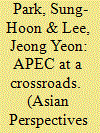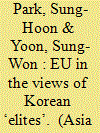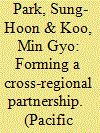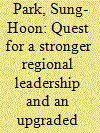|
|
|
Sort Order |
|
|
|
Items / Page
|
|
|
|
|
|
|
| Srl | Item |
| 1 |
ID:
090498


|
|
|
| 2 |
ID:
137811


|
|
|
|
|
| Summary/Abstract |
The last two decades have seen most significant developments, which led to incremental upgrading of the Korea-EU bilateral relationship, including the adoption by the European Commission in 1993 of a strategy paper toward Korea, the presidency role played by Korea in the third Asia-Europe Meeting (ASEM) Summit in 2000 and the launch and entering into force of the bilateral free trade agreement (FTA) in 2007 and 2011, respectively, as well as the upgrading of the relationship to a strategic partnership in 2010. The imagery of the EU, however, does not seem to have improved substantially as these series of positive developments in bilateral relationship might suggest, as manifested in a few recent studies conducted on the EU perception in Asia and Korea. As an extension of the two previous interviews of Korean elites carried out in 2006 and 2009, a new round of elite interviews has been conducted to find out how the perception of the EU in the mindset of Korean elites has changed over the past years. The main findings of this paper are as follows. First, among a number of changes found in the comparative analysis of the three interviews, the bilateral FTA that appeared at the top as an immediate image of the EU in the two previous interviews lost its place substantially. Instead, the Eurozone crisis has become one of most influential EU images in the mid of Korean elites. Second, the global actorness of the EU has become substantively weakened in the eyes of the Korean elites over the past few years. As this was most strongly pronounced in the group of media representatives, the authors expect it to have lasting impacts on the images of the EU in the wider Korean public.
|
|
|
|
|
|
|
|
|
|
|
|
|
|
|
|
| 3 |
ID:
099336


|
|
|
|
|
| Publication |
2010.
|
| Summary/Abstract |
The Korea-EU relations have undergone a substantive change during the last two decades. The bilateral Framework Agreement, which was first signed in 1996 and updated in 2009, has upgraded the bilateral relationship to a considerable extent. The common membership of Korea and the EU to the Asia-Europe Meeting (ASEM) has also expanded and deepened the channels of official contacts between the two parties. Among these factors, the Korea-EU FTA Agreement, which was initialed in October 2009, appears to have the potential to affect the relationship most strongly. The results of elites' interviews conducted during September 2009-April 2010 largely verifies this in a number of interesting aspects. Especially, most of the Korean elites perceive the Korea-EU FTA as an opportunity to maximize the effects arising from "the expanded markets", "reduced market risks" and "harmonized European business practices leading to reduced transactions costs". This also has had substantially positive impact on their perception of the EU's importance to Korea.
|
|
|
|
|
|
|
|
|
|
|
|
|
|
|
|
| 4 |
ID:
078846


|
|
|
|
|
| Publication |
2007.
|
| Summary/Abstract |
CRTAs have become a main feature of South Korea's newly found enthusiasm for a multi-track FTA strategy. In this study, we examine the rise of South Korea's aggressive FTA initiatives, with a special focus on the first cross-Pacific FTA, namely the South Korea-Chile FTA, and draw implications for South Korea's other RTA initiatives. South Korea's motivations to pursue CRTAs are complex. These include economic, political and diplomatic/leverage motives. South Korea's policy departure from its long-standing support for the multilateral trading system began with its FTA negotiations with Chile, a country located on the opposite side of the globe. Aside from the South Korea-Chile FTA, South Korea has been negotiating a number of other CRTAs. Most importantly, South Korea and the US began to negotiate a bilateral FTA in June 2006, the successful conclusion of which will have significant economic and strategic repercussions not only for South Korea but also for its neighbouring East Asian countries. The economic and strategic motivations of the political leadership, as well as the new bureaucratic balance of power centred on the Office of the Minister for Trade, have played a significant role in South Korea's dramatic rush toward RTAs. Although South Korea's pursuit of RTAs does not necessarily mean that it has completely abandoned the multilateral trading system, the policy departure is increasingly becoming obvious and significant.
|
|
|
|
|
|
|
|
|
|
|
|
|
|
|
|
| 5 |
ID:
111032


|
|
|
|
|
| Publication |
2012.
|
| Summary/Abstract |
The Korean economy has suffered two major economic crises over the past 15 years - the 1997 Asian financial crisis and the 2008 global financial crisis. After analyzing both the changes in policy environments and Korea's policy responses, the article argues that the ongoing global financial crisis provided a welcomed opportunity for Korea to increase its regional and global influence. Korea's regional leadership has been strengthened especially in promoting the "development" issue in a number of international forums and in establishing a more effective crisis-prevention framework in the Asian region. As the host country of the 5th G20 Summit Meeting in 2010, Korea initiated a number of global issues, such as "development", "global financial safety net", "green growth strategy", and has been successful in fortifying its position in the global arena. As a result, the global profile of Korea appears to have been raised both substantially and substantively.
|
|
|
|
|
|
|
|
|
|
|
|
|
|
|
|
|
|
|
|
|